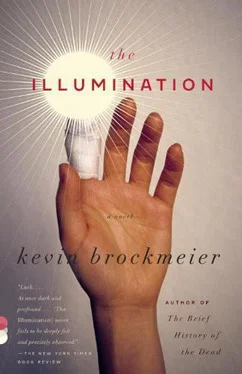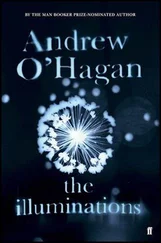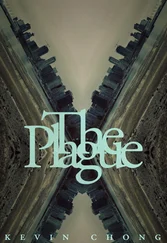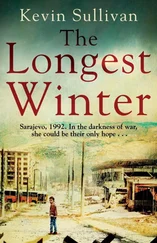Her voice was salted with the cheerful testiness of someone who was merely pretending to be angry, and though he was relieved that she was feeling well enough to badger him, he never knew how to react in such situations. It was as if the claim that he had offended someone, no matter how spurious, tripped a set of switches in his head. Even if he realized he was being teased and that the appropriate response was to do some teasing of his own, he could only answer squarely, with gravity and embarrassment. “Look. I’m sorry. I didn’t mean to imply… or to infer… to suggest that—”
“Relax, man. I’m just funnin’ with you.”
“Oh. Oh, all right then.”
The hot dogs revolved in their metal carousel. The drums of the frozen Coke machine made their ocean-in-a-seashell noise. Everything was spinning.
Ryan collected his water and headed for the door.
“Hey, what about that dollar seventeen?” Felenthia Lipkins called after him, and when he did an about-face she added, “Who’s the felon now?”
A week or so later, he was distributing leaflets in the parking lot of a cafeteria, watching the windshield wipers snap into place like flyswatters and fix the papers to the glass, when from behind him a voice said, “Excuse me.” He presumed the remark was addressed to someone else. As a rule, people avoided him while he was working. Some overburdened mother could walk outside with an armload of leftovers and three crying children at her legs, and still, if she spotted him near her car, she would linger by the building until he had moved on.
“Oh, I see how it is. Black girl says excuse me, and the white man won’t even answer.”
He swung around. It was her, Felenthia Lipkins, pronounced fuh-lin , not felon , the girl whose bones showed through her skin. She was standing with a little boy, no older than two, rubbing the luminescent blotch at the corner of his eye and repeating, “Yo, yo, what’s up?” to himself, as if he had just learned the phrase and didn’t want to forget it.
Felenthia cut her eyes at Ryan. “You’re the guy who thought he could leave without paying for his water, aren’t you?”
“And you’re the girl who hates white people.”
She nodded, impressed. “Touché. What are you doing with the flyers?” He handed her one from his satchel, and she read the verse printed at the top. “ ‘Truly the light is sweet, and a pleasant thing it is for the eyes to behold the sun. Ecclesiastes 11:7.’ Well, that’s fine and all,” Felenthia said, “but you’re forgetting Ecclesiastes 11:8: ‘If a man lives many years, let him rejoice in them all, but let him remember the days of darkness, for they shall be many. All that comes is vanity.’ ”
“Wow. You know your scripture.”
“Preacher’s daughter,” Felenthia admitted, and she gave the kind of speedy little dilatory curtsey that could not be mistaken for anything but a joke. “ You , though, I wouldn’t have guessed for a Christian type. Tan slacks, aftershave, gray hair in a side-cut. I was thinking businessman.”
“Well, in an earlier life, I was a stockbroker.”
“Uh-huh. And you made a billion dollars and stashed it away in the Cayman Islands and realized the hollowness of money so you resigned to devote yourself to—”
Which was when it happened again. She gasped, shutting her eyes, and her bones lit up. He could see them throbbing through her clothing, growing brighter with each pulse, every rib presenting itself to be counted. Her skull peered out from in back of her face. When she raised her hands to her cheeks, he saw her finger bones stacked on top of one another like the sunstruck windows of a skyscraper. Somehow she managed to support herself, though it must have been agonizing. The boy who was with her said, “Auntie Fen,” then turned it into a question, “Auntie Fen?” and tugged at her skirt.
Her knees pivoted and buckled. Ryan caught her just before she fell, holding her up by the arms. Together they waited for the episode to pass. He could not read his watch, so he measured time by the signal-circuit of a traffic light: two reds and a green, and then her pain surmounted some sort of peak and the brightness faded, lingering in a last flush of milky white. A hard sweat had broken out on her face. The boy was saying, “Auntie Fen, Auntie Fen, yo, yo, what’s up?” and a car was honking at the end of the aisle, and she tried to lift herself out of Ryan’s arms, but in the late-July heat that made the pavement ripple like a reflection in a pool of water, her legs kept keeling out from under her.
He waited until he was sure she had gained her footing before he let go. His work with the church had taken him to a thousand hospitals and nursing homes, so many that he frequently imagined the world was nothing but patients—there were recovering patients, and there were worsening patients, and there were patients whose time had not yet come. He had witnessed the effects of tuberculosis, anthrax, and malaria, of cystic fibrosis and viral pneumonia, Huntington’s and multiple sclerosis, lymphoma and dysentery. He had seen cancer after cancer, infection after infection, diseases that filled the body with bales of fluttering light and diseases that brushed lightly over the skin like snowflakes. Never before, though, had he witnessed something like this, a disease that confined itself so tightly to one system and filled it so uniformly, that blazed with such radiance and then vanished so completely. It was as if a firework had detonated in the shape of her skeleton. He could still see the afterimage on his retina. What was wrong with her, he wondered, what was she undergoing, and this time he could not stop himself from asking.
“A little indigestion,” she said.
“No, seriously, what just happened to you?”
“A touch of the flu.”
Clearly she wasn’t going to give him an honest answer. “Do you and your son need some help getting home?”
“Nephew. And I think we’ll manage.”
She pointed to the one-way street that ran past the cafeteria, where an apartment building was separated from the interstate by a spinney of pine trees. On either side of the walkway, rising from the grass, stood a pair of fluted concrete pillars, their lines meant to carry the eye to heaven, but the cement had fallen loose from them in chunks, exposing veins of black rebar that absorbed the sunlight and directed the eye inward rather than upward.
“That over there,” Felenthia said. “That’s us.”
Ryan watched her cross the road with her nephew, his great big steps and her tiny baby steps, until they reached the apartment building and disappeared behind a screen door. Then he returned to his satchel and his flyers.
That was the afternoon the pastor called him aside to tell him he was being transferred again. “Detroit. August first. Pack your bags, Brother Shifrin.” The first of August was only eight days away, and Ryan presumed he would not meet the girl again, but as it happened, he saw her once more before he left town.
He was riding with one of the other missionaries through Wheatley, a small agricultural community a few miles down the highway from their hotel, when they came to a stop sign across from a swimming pool. The sky was thick with tea-colored clouds, the kind that had a yellowing effect on the landscape. The trees and bushes stood motionless to the smallest leaf. Though it was barely noon, the insects were already intoning their night songs. The pool was not crowded, and Ryan was surprised to see Felenthia sitting at the end of the diving board, reading a magazine with her elbows on her knees. She looked wholly at ease, as if she had never suffered so much as a hangnail. The boy treading water beneath her had a glittering infection in his right eye. The other boy, who did a cannonball into the deep end while Ryan sat watching from the passenger seat, wore a fresh puncture mark, a luminous crater high on the shoulder plane of his back. Felenthia swatted at the air with her magazine. She might have been shooing mosquitoes. “Y’all fools quit splashing,” she said.
Читать дальше












